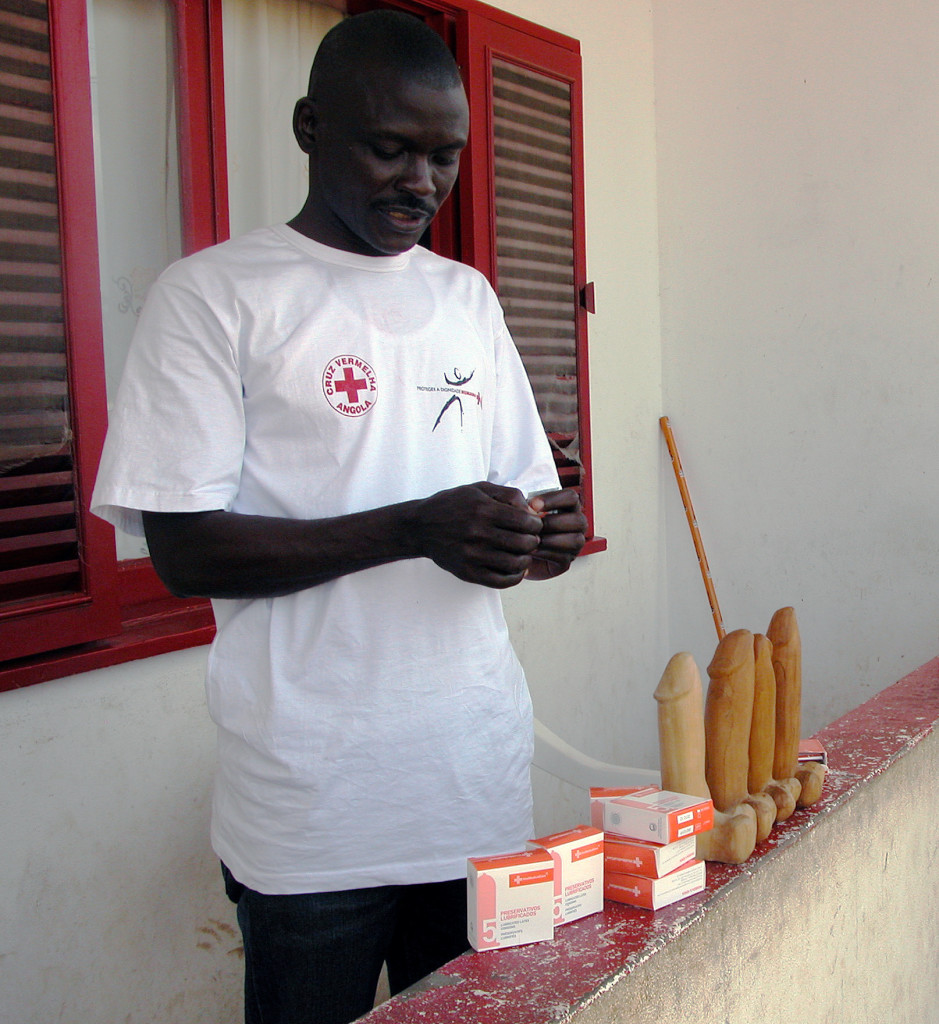For sero-discordant couples, it can bring a sense of ease about possible HIV transmission during sex. And this may be the [...]]]>
For sero-discordant couples, it can bring a sense of ease about possible HIV transmission during sex. And this may be the kind of use of PrEP society feels most comfortable with.
But a recent WHO recommendation that PrEP should be part of the standard armoury of prevention technologies for gay men and men who have sex with men has raised a few eyebrows.
Does PrEP, as some have argued, simply enable a commitment-free sexual licence which might have accounted for the early HIV epidemics?

ARVs as HIV prevention: freedom from fear, freedom from condoms or license for promiscuity? Credit: Mercedes Sayagues
PrEP discourses weave two interesting themes together: the medicalization of HIV prevention (where sex becomes driven by tablet regimens) and moral panics around sexual freedom (where sex for pleasure, unshackled from procreation, relationships and commitments, has free reign).
While no one would deny that medicines have brought great good to society – though there is a conversation to be had about who gets access to medicines, as the recent Ebola crisis has shown – there are questions to be asked about the impact of new medical technologies on our understanding of, and interest in, factors which drive human (sexual) behaviour.
Pleasure and protection
In the early responses to HIV, when treatments were not available, gay and other communities found ways to support each other and collectively change behaviour.
Political movements like ACT UP arose out of global indifference to the rising tide of deaths of those on the margins, and a new politics of sex and sexuality was also enabled: gay communities and activists were defiant, and adamant, that pleasure was to be kept firmly on the sexual agenda as much as protection.
With the rise of ARV treatments, some of these conversations around pleasure moved to the backburner.
And now that mass PrEP is around the corner, other questions about sexual networks, sexual desire, sexual pleasure, and sexual sub-cultures lose their urgency, and perhaps their funding.
While it can be argued that these questions become less relevant, indulgent even, what can be gleaned from our understanding of them is immeasurable.
Unpacking that almost magical interplay between individual agency, social influences and structural forces would benefit our understanding of other social challenges: crime, gender violence and racism come to mind, just for starters.
So popping pills becomes a panacea, but it may blunt our understanding of social glue and social decay.
Sex without fear
The moral anxieties around PrEP have swirled around for a while now: it promotes casual sex, it removes responsibility, it might encourage people to eschew condoms.
In fact, as Aidsmap reported from Melbourne, many PrEP study participants still opted to use condoms, finding that the addition of PrEP took away a lot of their fear and anxiety.
“It’s not like I’m going to go out and being like, ‘Ooh, bareback now. I’m protected, It’s fine.’ …I just don’t have the overwhelming stress and fear and guilt that I would have had” said Seth, aged 29.
One gay man, whose father had died of an HIV-related illness, said he’d decided to start PrEP when a relationship with another HIV negative man became condomless and non-monogamous “and I wanted a sex life free from fear”. PrEP gave him the same sense of control as ART, he argued.
The words condomless and non-monogamous may strike fear into the heart of many an HIV educator, but they bring together fascinating ideas around PrEP: medicines change behaviour in unpredictable ways, and pleasure and adventure remain central to human sexuality.
The need for social science to understand this is crucial – when science meets the bedroom, the outcome is never inevitable.
Note on blog title: “When science meets the bedroom” is the title of a symposium on PrEP at the recent Melbourne AIDS Conference.
Pierre Brouard, director of the Centre for the Study of AIDS at the University of Pretoria, South Africa, is a clinical psychologist interested in sexualities, gender, human rights, and finding just the right word to grace a sentence, convey empathy or complete a crossword.
]]>Language has always mattered in the AIDS epidemic. From the outset, stigma was fuelled by blaming phrases like “gay plague” or “African disease”. As early as 1987, sociologist Paula Treichler called AIDS an epidemic of signification, noting [...]]]>
Language has always mattered in the AIDS epidemic. From the outset, stigma was fuelled by blaming phrases like “gay plague” or “African disease”. As early as 1987, sociologist Paula Treichler called AIDS an epidemic of signification, noting that “the very nature of AIDS is constructed though language and in particular through the discourses of medicine and science.”
An example of this is the recent rallying cry “getting to zero”, that is, zero new HIV infections, zero HIV-related discrimination and zero AIDS-related deaths.
At first glance, this seems to be an exciting challenge and possibly a useful indicator of success. But is it possible that these goals are setting us up to fail and reflect a misunderstanding of such a complex epidemic as AIDS?
The emphatic repetition of the word “zero” sounds good on the political podium – but what might it mean at those various moments of infection, discrimination and death?
Let’s think about each zero in turn.
For zero new infections to occur we would need to live in an almost perfect world: where every person living with HIV would know their status, use protection whenever they had sex, be on anti-retroviral treatment with 100 percent adherence (to invoke the “treatment as prevention” effect) and always disclose their HIV status to their partner(s).
Young people would not have sex until they met their life partner, no one would have sex for money, no one would get drunk at a party and fall into bed with a complete stranger, and no sero-discordant couple would succumb to the temptation “just this time” to abandon a condom to make a baby. In this world there would be no infidelity, no rape, no lies, and certainly no deviation from the “test, treat and adhere” script.
Zero HIV-related discrimination sounds wonderful too. But is this realistic? To date no major parliamentarian in my own country, South Africa, has been open about their HIV status and I struggle to think of more than one or two major public figures or celebrities who are openly HIV positive. Racism, xenophobia, homophobia and sexism are alive and well, despite our progressive constitution: perhaps the tendency to discriminate may be wired into our social and political DNA.
Zero AIDS-related deaths is the most urgent aspect of the zero mantra, and closest to the core business of biomedicine. We know antiretroviral treatment (ART) works, in most cases. But to reach a point of zero deaths we would need everyone on treatment to adhere all the time. Sadly, the realities of living with a chronic disease seem to militate against this, given the impact of personal, social and economic factors on adherence.
And for people to be on treatment they first have to access the drugs: in South Africa, supply chain and other administrative challenges have meant that, despite having the largest ARV programme in the world, or because of it, we fail to deliver treatment on time to all who need it.
So the zero rhetoric is problematic. Targets are important, but there is a danger that the zero language closes the door on nuance and complexity, risking blame and othering of those who fail to comply with well-intended public health injunctions.
By setting individuals and systems up to fail, we do them and ourselves a disservice, and we become intolerant towards human frailty and blind towards structural challenges.
We can learn from critiques of the “zero tolerance” rhetoric around crime. In an important essay, Vijay Nagaraj asks whether the use of zero tolerance language in the public discourse around violence against women makes for good populist politics but does not translate into progressive and well-informed public policy.
In the aftermath of highly publicised gang rapes and murders in India, she argues, there has been tighter social control over women and girls in the name of security and “prevention”.
So instead of trying to “get to zero”, we need to aim for a deeper understanding of the social and structural underpinnings of AIDS, and question the unintended consequences of our programmatic language.
Pierre Brouard, director of the Centre for the Study of AIDS at the University of Pretoria, South Africa, is a clinical psychologist interested in sexualities, gender, human rights, and finding just the right word to grace a sentence, convey empathy or complete a crossword.
]]>


